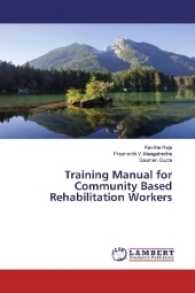- ホーム
- > 洋書
- > ドイツ書
- > Humanities, Arts & Music
- > Philosophy
- > 20th century, 21st century
Full Description
In the chapters, Marcuse scholars explore three related topics: First, Marcuse's theory as it applies to the relationship between neoliberalism and authoritarianism, including both the historical relationship between the two and the modern re-emergence of authoritarianism and nationalism in neoliberal states today.







